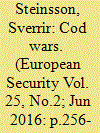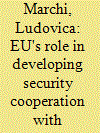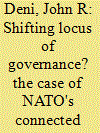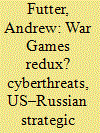|
|
|
Sort Order |
|
|
|
Items / Page
|
|
|
|
|
|
|
| Srl | Item |
| 1 |
ID:
144770


|
|
|
|
|
| Summary/Abstract |
The occurrence and outcomes of the Cod Wars defy both popular and academic expectations. Iceland, a microstate, essentially won four disputes against the UK, a great power. The two states furthermore belonged to a Western security community, sharing significant institutional, economic and cultural ties. This article reviews the history and international relations literature on the Cod Wars to explain and evaluate why the Cod Wars occurred and why Iceland won them. This article also explains what lessons international relations scholarship has learned from the Cod Wars for liberal international relations theory, realism and asymmetric bargaining.
|
|
|
|
|
|
|
|
|
|
|
|
|
|
|
|
| 2 |
ID:
144767


|
|
|
|
|
| Summary/Abstract |
This article tracks the European Union’s efforts at the Association of Southeast Asian Nations (ASEAN) Regional Forum (ARF), from 2004 to 2008, to encourage Myanmar directly or indirectly to engage in security cooperation. It, then, explores Myanmar and ASEAN's reactions to the devastation caused by Cyclone Nargis to Myanmar’s Irrawaddy delta in 2008. It focuses on ARF as a forum whereby interactions take place. It examines whether the complementary of the analytical variables provided by the logic of consequences and appropriateness [March, J.G. and Olsen, J.P., 1998. The institutional dynamics of international political orders. Oslo, Arena Working Paper No. 5; 2004. The logic of appropriateness. Oslo, Arena Working Paper No. 9], social mechanisms [Checkel, J., 1999. Social construction and integration. Journal of European public policy, 6 (4), 545–560.] and observations derived from interviews (Southeast Asia and Brussels) can explain ASEAN and Myanmar’s reactions and, also, the EU’s behaviour in relation to the Myanmar-Nargis event. The EU’s role is explored through the co-chair’s summary reports of the meetings that the EU co-chaired with ASEAN. The article uncovers the EU’s efforts to encourage ASEAN to take up responsibilities and Myanmar to accept multilateral security options. It argues that, as the EU tried to inspire Myanmar to connect with cooperation, “Myanmar hit by Cyclone Nargis” motivated the EU Council to include the "responsibility to protect" as a new goal of the European foreign and security policy of December 2008.
|
|
|
|
|
|
|
|
|
|
|
|
|
|
|
|
| 3 |
ID:
144769


|
|
|
|
|
| Summary/Abstract |
Contrary to some expectations, the Baltic states’ accession to the EU in 2004 was not followed by an improvement in their relations with Russia. Instead, the Baltic states became known as the “troublemakers” of EU–Russia relations. This was commonly explained by their history and national identity, which contributed to an understanding of the Baltic concerns as marginal. The Ukraine crisis brought a reaction of “I told you so” by the Baltic states that for many years had been warning the West about Russia’s expansionist ambitions. This article explores the ideational underpinnings of the gap between the Baltic states’ perceptions of and relations with Russia on the one hand and mainstream views in Europe on the other. It identifies liberal interdependence, democratic peace, and realist geopolitics as key ideas that have framed the EU’s and Baltic states’ perceptions of Russia. In the vein of constructivist foreign policy analysis, these ideational structures are seen to condition the EU’s and Baltic states’ interests and policies vis-à-vis Russia. An analysis of the “Baltic factor” helps to illuminate the contradictions and shortcomings in the EU’s Russia policy and review its ideational basis which is now in need of a strategic rethink.
|
|
|
|
|
|
|
|
|
|
|
|
|
|
|
|
| 4 |
ID:
144766


|
|
|
|
|
| Summary/Abstract |
In early 2012, NATO's then-Secretary General, Anders Fogh Rasmussen, unveiled the Connected Forces Initiative (CFI), an effort designed to increase allied interoperability and readiness. Through three lines of effort – training and education, exercises, and better use of technology – the CFI is intended to help the alliance maintain the operational and tactical interoperability it developed in Afghanistan. At first glance, the CFI appears to represent an example of the claims of some neo-institutionalist scholars that there is a shift in the locus of governance from member states to NATO. However, this article takes a deeper look and concludes that in fact the locus of security governance is not shifting, at least not in this instance. Member states of the alliance retain several means of controlling and influencing NATO, thereby preventing it from developing a significant degree of autonomy, in contrast to the European Union or United Nations.
|
|
|
|
|
|
|
|
|
|
|
|
|
|
|
|
| 5 |
ID:
144765


|
|
|
|
|
| Summary/Abstract |
Some 30 years since the release of the Hollywood blockbuster War Games, the possibility that hackers might break into nuclear command and control facilities, compromise early warning or firing systems, or even cause the launch of a nuclear weapon has become disturbingly real. While this challenge will impact all nuclear-armed states, it appears particularly acute for the USA and Russia given their large, diverse, and highly alerted nuclear forces. The fact that east–west relations have deteriorated to a nadir perhaps not seen since the 1980s, strategic instability has increased – particularly in the wake of the Ukraine and now Syria crises – and that the nuclear arms reductions agenda appears to have reached a standstill makes this challenge particularly pressing. In this discouraging milieu, new cyberthreats are both exacerbating the already strained US–Russia strategic balance – particularly the perceived safety and security of nuclear forces – and at the same time creating new vulnerabilities and problems that might be exploited by a third party. Taken together, these dynamics add another major complication for current arms control agreements and possible future nuclear cuts, and also seem likely to increase the possibility of accidents, miscalculation, and potential unauthorised nuclear use, especially given the large number of nuclear weapons that remain on “hair-trigger” alert.
|
|
|
|
|
|
|
|
|
|
|
|
|
|
|
|
| 6 |
ID:
144768


|
|
|
|
|
| Summary/Abstract |
In 2014, the European Union (EU) launched the sixth review of the Athena mechanism that finances the common costs of military operations launched in the framework of its Common Security and Defence Policy (CSDP). In the run up to the review, there were expectations that it would improve financial burden sharing in CSDP operations by expanding common funding for them. However, these hopes were disappointed; the review became a diplomatic tug of war between France, the strongest supporter of expanded common funding, and the UK, its strongest opponent. In the end, France agreed to the UK's terms to ensure that the existing level of common funding would not decrease. This article analyses the Athena review from a neoclassical realist perspective. It argues that the review's outcome was due to the imbalance of influence among EU member states and the diverging preferences of their Foreign Policy Executives (FPEs). These factors caused the Athena review to remain in the hands of a small group of member states that had diverging utility expectations and ideological preferences. Thus, the article shows that a surprisingly intense burden-sharing dispute has emerged within CSDP.
|
|
|
|
|
|
|
|
|
|
|
|
|
|
|
|
|
|
|
|
|